21-01-20Akvaponibygget är nu i full gång på Vattencentrum
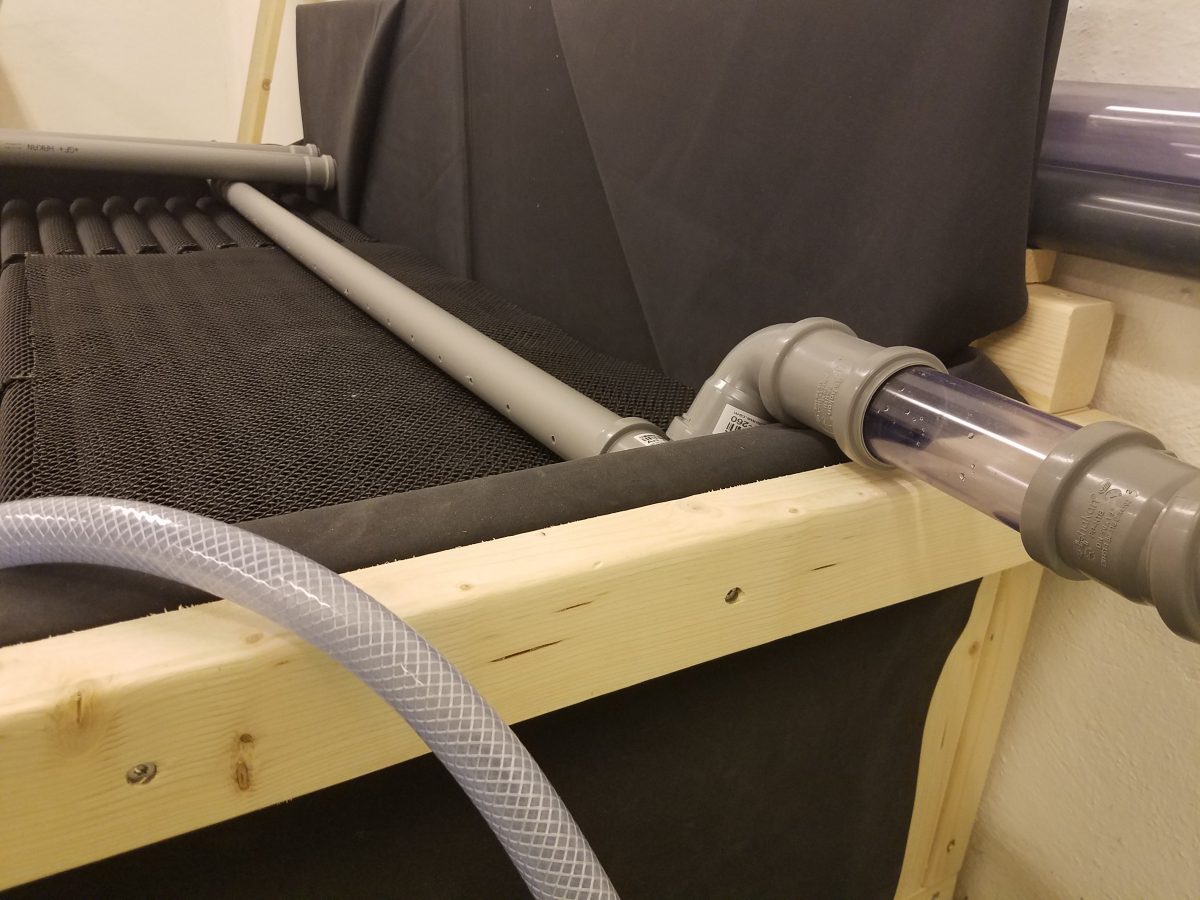
Byggnationen av vår akvaponi inom projektet Akvaponi i Roslagen är nu i full gång i källaren på Vattencentrum, Campus Roslagen.
Golvet är målat, vatten och el är indraget i lokalen. Fisktanken är på plats, slasktanken är färdig och odlingsbäddarna börjar ta form och vi väntar med spänning på att kunna starta upp systemet. Invigningen sker 26 mars då vi även håller vår konferens Inspiration Vatten.
Se bildserie från bygget nedan, fler bilder finns på vår facebooksida.
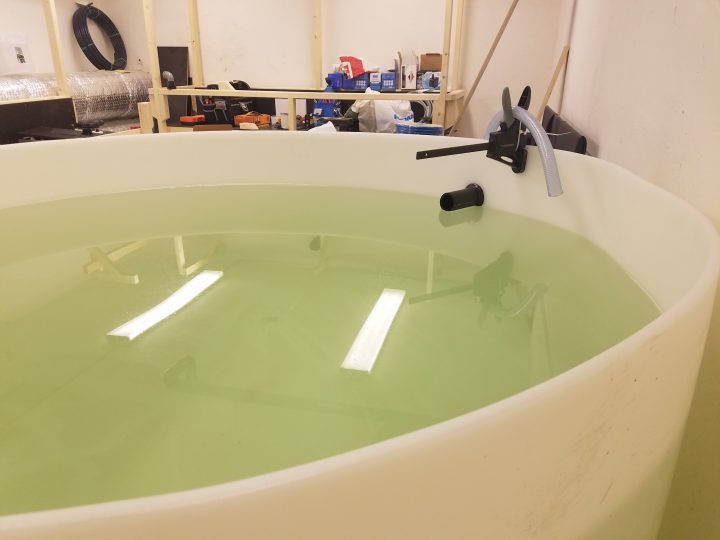
Fisktank
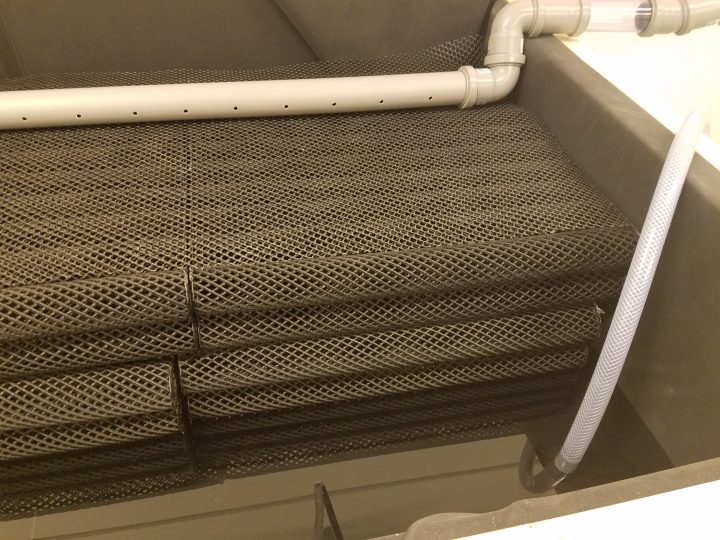
Sump med biobäddar.
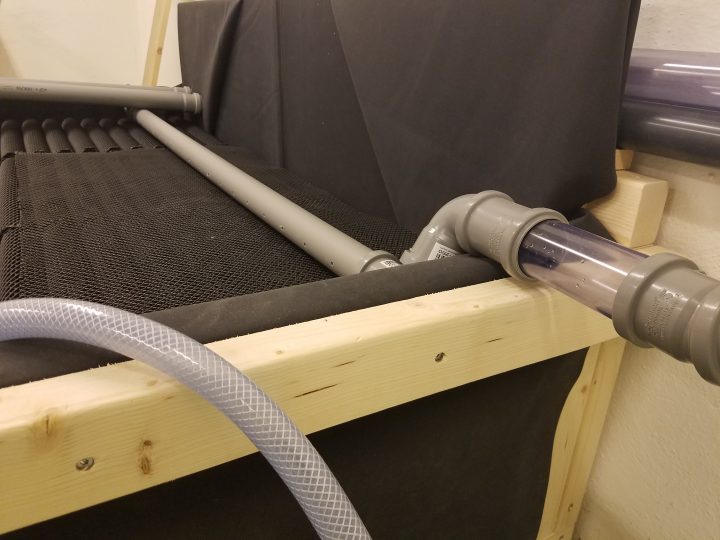
Sump med inlopp från fisktank till höger i bild.
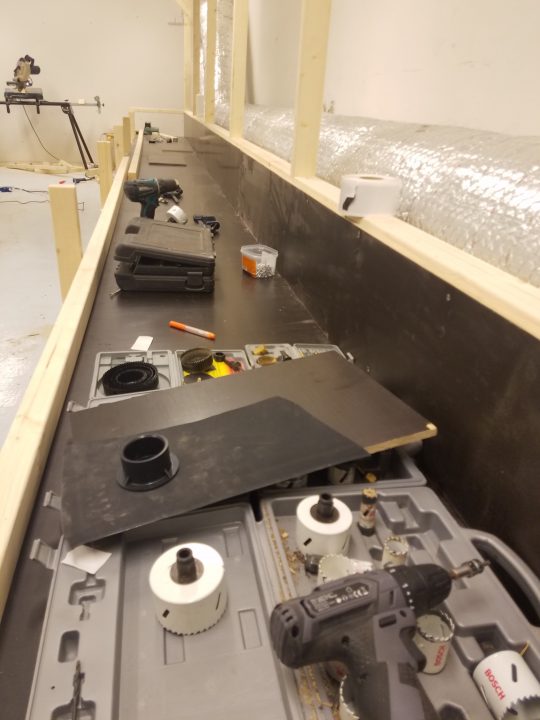
Odlingsbädd under konstruktion
Vid frågor, hör gärna av er till info@vattencentrum.se
Anmäl er gärna till vårt nyhetsbrev
Fler Nyheter
30/08/18 - 09:55
Nyhetsbrev
Vi står framför en nystart efter denna omvälvande sommar där frågor om vatten har haft huvudrollen.
Vi välkomnar Briggen Tre Kronor till Norrtälje. Vi är med på plats den 14-15 september och berättar och visar teknik för vattenbesparing och avloppsrening för att skydda Östersjön.
Vi är en del av den Stora vattenutmaningen som startades denna torra sommar av en medveten familj i Roslagen. Utmaningen är att halvera sin vattenkonsumtion. Vi startar nu med milstolpar varje månad och Stora Vattenutmaningsfesten går av stapeln nästa år i september. Kampanjen går ut på att ni hemma eller på kontoret eller i industrin ger handfasta tips och exempel på hur ni gör för att minska vattenanvändningen. Bästa månadstipset presenteras och belönas. Nästa år kommer vi att kora bästa resultat från allmänheten, företagen och organisationer, alltså tre kategorier. Anmäl er till kampanjen via vår hemsida.
Som ni vet är vårt mål är att alla beslut som rör vatten och avlopp ska baseras på kunskap och skydda vattenresurserna och Östersjön. Vi deltar i tre internationella vattenprojekt med fokus på Östersjön: BATSECO om båttömningsstationer, RETROUT om återställning av vattendrag för fiske och COASTAL om planering på land och hav. Läs mer om projekten här.
Lite mer om vad som har hänt under året
Vi har blivit tio personer i och med att Rasmus Thunell har anställts som projektadministratör hos oss. Rasmus är en nyutexaminerad civilingenjör (Energi & Miljö med master inom Miljöteknik och hållbar infrastruktur) och gjorde sitt examensarbete inom grundvattenmodellering på UCV under våren. Han kommer även att ha en del ansvar för kommunikation. Utvecklingscentrum för vatten växer genom nya medarbetare och ibland får vi medarbetare som lämnar oss för andra uppdrag. Vi har lämnat startsträckan och vi har blivit en etablerad organisation efter våra första fyra åren. Idag är vi en verksamhet som sprudlar av aktiviteter och projekt.
Den äldsta av våra projekt, som började som förstudien Demotest Skärgård har gett upphov till ett företag, Vatteninfo med en permanent utställning för vatten och avloppsanläggningar. Där huserar Norrtälje kommuns VA-rådgivare som ger neutral rådgivning till allmänheten. Projektet har också lett till att vi startade två av VINNOVA- finansierade projekt. Testbädd dricksvatten eller som vi kallar det internt – Poseidon-projektet, utvecklar en testanläggning för dricksvattenfilter. Målet är att både underlätta innovationer och certifiera de filter som redan finns på marknaden. Den 20 september blir en viktig milstolpe nådd, vi inviger SITE 0 på Kaserngatan 11 där man ska kunna testa reningsförmågan för olika material. Vill du vara med på invigningen? Gå in på vår hemsida under events och anmäl dig där. Programmet finns även där.
Utbildning
Till hösten har vi gjort våra grundvattenkurser ännu intressantare med möjlighet till laborationer och handgriplig erfarenhet av provtagning och analys. Kurserna som handlar om mineraler i grundvatten samt övervakning och analys har fått fräschare program. LTU:s dagvattenkurs går för fjärde året i rad hos oss. Det är en kurs på 7,5 hp och är mycket populär. Vi deltar även i en internationell utbildning för kommunala tjänstemän från Asien och Afrika i form av SUWAS som drivs av Niras. Vi använder utställningen även i utbildningssyfte och de besöker oss under en halv dag.
Nätverk av kommuner (KOMMO)
Nästa möte blir den 12 oktober och handlar om tre aktuella frågor:
Är du intresserad av att delta i våra aktiviteter? Gå in på vår hemsida och anmäl dig där. Vill du komma på besök, maila till info@vattencentrum.se. Vi har öppet 10.00 – 16.00 varje vardag och torsdagar till 19.00, lunchstängt kl. 12.00 – 13.00.
21/12/22 - 09:44
God Jul önskar UCV
UCV önskar er en God Jul och Gott nytt år!
Avvikande öppettuder under jul och nyår:
måndag 26/12 STÄNGT
fredag 6/1 STÄNGT
23 december 9-12
30 december 9-12
5 januari 9-12
I övrigt gäller våra vanliga öppettider:
Kontoret är bemannat måndag – fredag kl. 10-16. Lunchstängt kl. 12-13.
Endast förbokade besök.
Telefonväxeln har öppet måndag – fredag kl. 10- 16. Lunchstängt kl. 12-13.
För frågor enskilt kring vatten och avlopp boka en tid via Rådgivning
24/09/18 - 10:46
AQUA-Q vann 1:a pris i IWA Award Ceremony
AQUA-Q - en av våra projektpartners inom projektet Testbädd dricksvatten var i förra veckan i Tokyo på IWA World Water Congress & Exhibition 2018.
AQUA-Q och projektet AQUATRACK (dricksvattensäkerhet och återanvändning av vatten) och borttagning av läkemedelsrester med ozon vann 1:a pris i IWA Award ceremony i gruppen Market-changing Water Technology and Infrastructure. Projektet var en av 160 ansökningar från 45 länder.
Läs mer på aqua-q.se och worldwatercongress.org
21/01/20 - 16:22
Akvaponibygget är nu i full gång på Vattencentrum
Byggnationen av vår akvaponi inom projektet Akvaponi i Roslagen är nu i full gång i källaren på Vattencentrum, Campus Roslagen.
Golvet är målat, vatten och el är indraget i lokalen. Fisktanken är på plats, slasktanken är färdig och odlingsbäddarna börjar ta form och vi väntar med spänning på att kunna starta upp systemet. Invigningen sker 26 mars då vi även håller vår konferens Inspiration Vatten.
Se bildserie från bygget nedan, fler bilder finns på vår facebooksida.

Fisktank

Sump med biobäddar.

Sump med inlopp från fisktank till höger i bild.

Odlingsbädd under konstruktion
Vid frågor, hör gärna av er till info@vattencentrum.se
Anmäl er gärna till vårt nyhetsbrev




